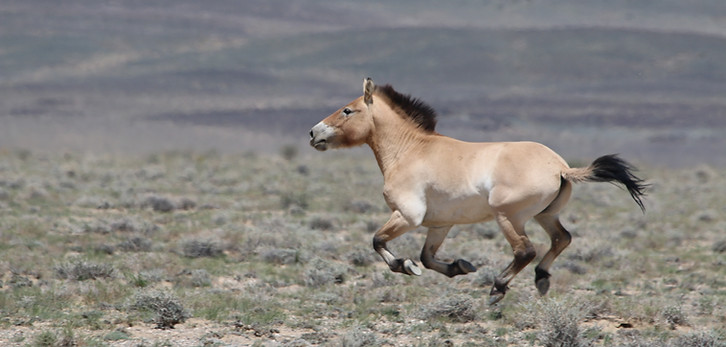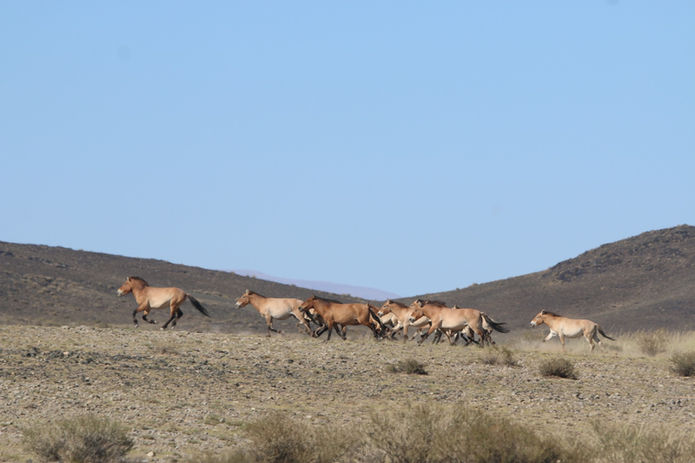TOUCHING WILD with Bonny Mealand
LEARNING WILD
Mongolia
COMING IN 2024

THE RETURN of the Takhi
(Equus ferus ssp.Przewalskii)
In 1992 the fierce hearted, ochre hued primordial wild horses of Mongolia were returned to their historical home in the Great Gobi B Strictly Protected Area (Gobi SPA) which is in the Dzungarian Gobi desert. Although they had grown up the other side of the world these pioneering equines quickly adapted to life on the Steppe and thrive in this wilderness. Living alongside wolves, Khulan (Asiatic wild ass, equus hemionus kulan), goitered gazelles and many other native Mongolian species they soon became integrated and reclaimed their place in the ecosystem they’ve evolved to inhabit.
So we are very excited to invite you to join the first ever Learning Wild trip to Mongolia to observe and learn about these iconic equids. This once-in-a lifetime experience promises to be not only an a rare and immersive journey through a wonderful country but also an opportunity to directly study and learn from and about the world’s last truly wild horse.


OUR CHOSEN CHARITY
Our project partner - International Takhi Group - who work tirelessly to protect the Gobi B reserve and it’s inhabitants, will introduce us to the local area, and teach us about their important work. Each Learning Wild booking will support the vital work of this charity.
These are low impact educational travel opportunities to stimulate and satisfy mind, heart, and soul. They invite you to connect with and better understand the local communities who help protect and support this very special ecosystem and its wildlife.
You will have the opportunity to stay in the guest yurts of nomadic families as they live their everyday life. Your support will help bring desperately needed economic stability to the people who are directly connected to and living alongside the wild Takhi.
You will have the rare opportunity to be taken on exclusively guided tours through the protected area and the adjacent buffer zone where you will get to see the unique biodiversity in this arid landscape and witness the co-existence of wild and domestic animals and their keepers.

BASIC ITINERARY
Great Gobi B
Together we will travel from Mongolia’s capital city, Ulaanbaatar, to Great Gobi B SPA, a strictly protected area and UNESCO biosphere reserve. The diverse landscape of the area provides a stunning backdrop for our Learning Wild course, with wide Gobi steppe, canyons, and mountains surrounding us as we learn.
Once in the Great Gobi B SPA, we will immerse ourselves in the lives and culture of local herders. Nomadic herders co-exist and share resources with the wildlife of the area. Their culture is rooted in nomadic tradition, where herders migrate between spending the winter in the Gobi plains and the pastures of the Altai mountains in the summer.
We will visit their summer camps to learn first-hand about the daily routine of the herders. Activities will include shadowing herders as they tend goats and sheep, milking livestock, and preparing milk products. We will visit a domestic horse breeder and get to learn about traditional methods of keeping horses in Mongolia. Here, the domestic horses are also allowed to roam free. The highlight of the cultural experience will be the visit of a local Naadam festival . This festival attracts people from all over the region who travel with their domestic horses to compete in horse racing and challenge themselves in Mongolian wrestling and archery.
The main focus of our Learning Wild experience will be studying and observing the wild lives of Takhi (Equus ferus ssp.Przewalskii) and you will also have the opportunity to spend time with the people who are responsible for protecting and studying this population. With over 20 years of records and observations the biologists and conservationists have a wealth of information and experience to share and maybe even more importantly they hold a deep connection and enthusiasm for the Takhi themselves.
You will be taken on field trips and also have the rare privilege of spending two nights camping at two different oases where you will observe wild horses and Khulan at sunrise and sunset. This special place is the only area where you can see both Takhi and Khulan, together in the same wild habitat. At the oasis animals come to drink and forage on different nutritious vegetation in this sparse environment. It is a bird haven and if you are lucky you might you can see wolves hunting.
Research will involve techniques such as tracking and observing wildlife, and assisting local rangers. Studying equines will be our focus, but we will also be able to see the other fauna in this biodiverse area when the opportunity arises. The area is home to several other rare large mammals, such as Siberian ibex, snow leopard, grey wolf, Eurasian lynx and goitered gazelle.
HIGHLIGHTS
-
Home to the Przewalski’s horse (takhi) once extinct in the wild and reintroduced back to Great Gobi “B” SPA where they were last seen in the wild in the 1960s.
-
Second global stronghold of the Asiatic wild ass (khulan) another member of the wild horse family
-
Breath-taking scenery with small green oasis on the golden Gobi plains against the background of the Altai mountains in a true wilderness setting
-
Home to several other rare and charismatic large mammals: Argali wild sheep, Siberian ibex, Goitered gazelle, grey wolf, snow leopard, Eurasian lynx, Pallas cat, red fox, Corsac fox.
-
Large diversity of small mammals and birds.
-
Many endemic plant species can be observed along with the Dzungarian Saxaul.
-
Home to a nomadic herding culture still very much rooted in a nomadic tradition where herders migrate between the Gobi plains where they spend the winter and the lush summer pastures in the Altai mountains.
-
The area is also home to a minority of traditional Kazakh herders with their differently shaped and elaborately decorated gers.
-
Here's a poster of some of the inhabitants of the GGB.
GGBSPA is the only area where you can see these two members of the wild horse family in the same habitat
No paved roads, powerlines, light pollution
or other signs of modern civilisation
(Not even airplanes fly over this region!)
Your Guides

Dalaitseren (Dalai) Sukhbaatar holds a MSc and BSc in Zoology from the National University of Mongolia. Since 2017, he has been working as a Takhi researcher for the International Takhi Group and is based in Takhiin Tal, the Great Gobi B SPA. His father was a former director of this protected area and Dalai grew up with the wild horses. He is proud to play an important role in the survival of this species.

Dagvasuren (Dagvaa) Gerelchuluun is a ranger of the Great Gobi B SPA. He grew up in a herder household in the wide Gobi steppe. He loves riding his domestic horses and exploring the unique wilderness. Dagvaa is enthusiastic about observing wildlife every day and he will share a lot of insights about this region and its inhabitant with you.
%20and%20Dalai%20(right)_JPG.jpg)
Reinhard Schnidrig is the president of the International Takhi Group. He holds a PhD in Zoology, Wildlife biology and Behavioural Biology. He leads the wildlife management and forest biodiversity section at the Swiss Federal Office for the Environment, a post which he has held since 2005. As a horse lover he works passionately in his free time for the reintroduction of the wild horses and the conservation of their habitat. During this course he will share his experience with the wild horses of almost 30 years with us.
Dr. Emily Kieson (Equine International) holds a PhD in Comparative Psychology, a MS in Psychology, and a graduate degree in Equine Science. Her research focuses on equine behavioural psychology, equine welfare, and horse-human interactions as they apply to both horse owners and equine-assisted activities and learning programs. Her current research focuses on equine affiliative behaviours to study how horses create and maintain social bonds and how those can overlap with human affiliative behaviours to create authentic lasting friendships between horses and humans. She also has a passion for supporting sustainable systems of horse management and husbandry that promote physical and psychological welfare of the horse while simultaneously supporting sustainable ecosystem practices on small and large scales (for both feral and domestic equids).
To learn more about Emily and Equine International please click here:
Bonny Mealand (Touching Wild) qualified as an Equine Podiatrist in 2005 and has been committed to understanding, implementing and promoting a whole horse approach to health and well-being ever since. Bonny specialises in working with wild, free-living equines and “difficult” domestic equines by building trust and helping them learn to be handled in a low stress way. A short clip of Bonny working with some Takhi horses can be viewed here - BBC Inside the Zoo.
Bonny is committed to constantly learning as much about and from equines as possible. Believing that it is possible to define what a life of quality looks like at both a species and individual level. She then uses this perspective to implement a high standard of welfare into their domesticated lives. She is also a retained Firefighter, Somatic Yoga and Mindfulness Teacher and BHS Welfare Advisor and is a MSc student at the Dick vet (University of Edinburgh) studying Equine Science.
To learn more about Bonny’s work please click here:
She is also the UK representative of the world renown Equine Ethologist Lucy Rees


Your Hosts
OUTLINE ITINERARY
15 days (7 days field workshop in the GGB SPA
and 7 days journeying and exploring Mongolia)
This is presently a flexible schedule which
will be confirmed closer to the trip.
From Sunday 9th July
Day 1:
Day 2:
Day 3:
Day 4:
Day 5:
Day 6:
Day 7:
Day 8:
Day 9:
Day 10:
Day 11:
Day 12:
Day 13:
Day 14:
Day 15:
Arrive in Ulaanbaatar Explore Ulaanbaatar and visit of the monastery Gandan.
Domestic flight
(Ulaanbaatar ↔ Khovd,Western Province)
Visit of a local Naadam festival
Travel from Khovd to Takhi in Tal Driving to the
Great Gobi B Strictly Protected Area through
the Bodonch canyon.
Orientation, equine studies, behaviour,
observation, research
Full day field trips accompanied by takhi biologists observing takhi, khulan and domestic horses in the Gobi)
Equine studies, behaviour, observation, research
Full day field trips accompanied by takhi biologists observing takhi, khulan and domestic horses in the Gobi)
Equine studies, behaviour, observation, research
Full day field trips accompanied by takhi biologists observing takhi, khulan and domestic horses in the Gobi)
REST DAY
A day spent with a herder family to
experience the nomadic lifestyle
Travel from Takhiin Tal to Khovd
Domestic flight
(Khovd ↔ Ulaanbaatar)
A day in sightseeing in Ulaanbaatar
Some of the things you will experience:
-
A day in sightseeing in Ulaanbaatar with
a visit of the monastery Gandan.
-
A English speaking guide will accompany
the group the whole time.
-
A day spent with a herder family to
experience the nomadic lifestyle.
-
3 full days field trips accompanied by
takhi biologists observing takhi, khulan
and domestic horses in the Gobi.
-
ITG president Reinhard Schnidrig will
accompany the group in Takhiin Tal.
-
Visit of a local Naadam festival.
COURSE COST
Maximum Participants - 8
The whole experience costs €3700pp
Buying a ticket for £620 is the deposit
to secure your place.
International flights and visas are not included. See below for full details.
INCLUDED in the Course Cost
The following costs are included in the price of the experience:
-
All accommodation during the trip - Simple hotels (in Ulaanbaatar & Khovd). Sleeping in traditional Mongolian yurts or tents in the camp in Takhiin Tal.
4 nights sleeping in tents inside the GGB SPA and during the journey to the protected area.
-
All the educational teaching and materials.
-
All meals during the trip. 3 meals/day and snacks full board with our own cook. Water/tea/coffee. Typical Mongolian kitchen (vegetarian dishes on request). One day with meal cooked by a local herder family. Water in sufficient quantity.
-
All domestic transfer services (flight, car, etc.). Cars and drivers are organised by the tour operator - OdkhaTravel
-
Border certificate for the border region
-
Drivers with all-terrain car
-
Entrance fee Great Gobi B
-
Project contribution Great Gobi B
NOT INCLUDED in the Course Cost
The following costs are not included in the price of the workshop:
-
International Flights
Book your flights here - Mongolian Airlines
-
Visa fees
PLEASE NOTE:
The management of GGB SPA and ITG point out that no
emergency evacuation can be carried out by the GGB SPA team.
It is advisable to take out international
health insurance and accident insurance.
The logistical arrangements in Mongolia are organised
the tour operator: Odkha Travel, Mongolia (www.odkha-travel.de)



















